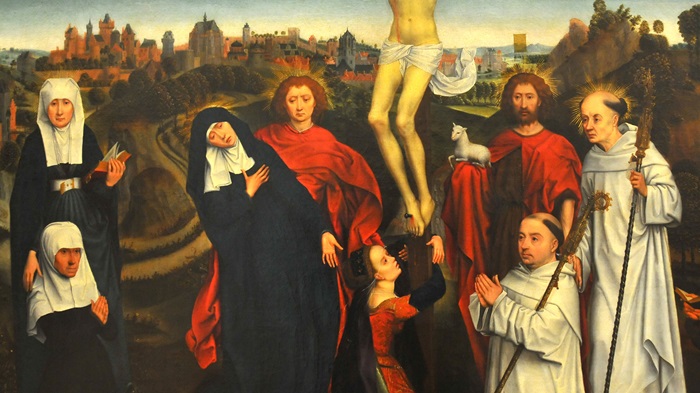[fbshare type=”button” float=”right” width=”100″] By Regis Martin

There exists a charming and instructive tradition in the Church—perhaps of apocryphal origin, I do not know—which traces its pedigree back at least as far as Tertullian, that fiery North African Father of the third century, according to which our Blessed Lord died on the Cross exactly thirty-three years to the day following His conception by the Holy Spirit in the womb of His virgin mother Mary. It all happened on the twenty-fifth of March, the feast of the Lord’s Annunciation, one of two feasts on which we are expected to genuflect while reciting the creed. And the other? The Nativity of the Lord—Christmas—falling nine months to the day later.
By means, therefore, of a most extraordinary convergence of calendar dates, which only God Himself would seem clever enough to contrive, both events—Conception and Cross—events on which the world’s salvation depends, Mary was there, remaining equally and indispensably present to each. Both at the beginning, when the Word took flesh, and at the very end when that same flesh—blood, marrow, and bone—were nailed to the Cross, His spirit descending into the silence and the horror of Sheol: She was there. And the point of all this? I mean, where am I going with this conceit of the calendar? This isn’t an exercise in Mariology, but rather a series of conferences on the theme of Christ, so what is my point?
Well, two things, two points need to be made which bear upon that Christological theme, including also the practical fallout for the life of men from it. The first is the fact that all salvation depends on Mary, because it comes through Mary. If the success of her Son’s saving mission requires the prior consent of the mother, then it follows that her co-operation is crucial to the plan of God. Maybe that is why the single most important four letter word in the language is fiat, even if it isn’t an English word. May all this, says Mary in reply to the astonishing invitation issued by the angel, “be done unto me according to thy (meaning God’s) word.” She does not withhold the freedom of her will, but instead surrenders it perfectly to God. And, second, whatever correlative understanding we come to concerning Christ and the redemption He wrought, it must likewise derive from her, from she who became, in the happy phrase coined by the poet Wordsworth, “our tainted nature’s solitary boast.”
What an amazing conjunction that is! That both the Word whose sudden and unforeseen eruption into our world, and the matchless wisdom to understand the burden Christ came to bear, entirely derive from the Woman whose whole mystery is of a piece with the unseen God of whom, in a daring condescension from on high, she became the ordinary human mother. She who is “younger than sin,” to recall a lovely line from Bernanos, became the vessel—the sacred viaduct stretched between earth and sky—across which God Himself poured out the undivided substance of His eternal and triune life into the life of man. Indeed, the very one who, in Augustine’s inspired image, “gave milk to our bread.” Could there exist among mere mortals a destiny higher than this?
If God breaks Himself to become our bread, then we surely need to know something of the woman whose recipe made possible the production no less of the loaf. Of course, putting it with perfect accuracy, the recipe belongs to God, but to whom did He entrust the work that needed to be done in the kitchen? That’s the question. And the point is, it all flows through her. Certainly the event of the incarnate God turns entirely on her willingness to become the human source of the divine river, the human origin of the gift that is nothing less than God Himself. Who else does Jesus look like if not the mother whose body fashioned His own? At the same time, our very understanding, the extent to which we succeed in unpuzzling the Mystery, that too derives entirely from her, the living memory of all that God entrusted to the mother of His Son.
Regis Martin is the author of over half a dozen books, including The Beggar’s Banquet: A Personal Retreat on Christ, His Mother, the Spiritual Life, and the Saints. With his trademark mastery of the English language, Martin leads the reader to contemplate the wonders of God and the Catholic faith.